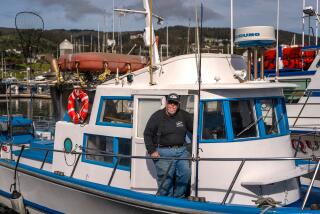New Regulations Wipe Out Lake Erie Fishing Industry
- Share via
ERIE, Pa. — Jerry Mathers once pulled in 150,000 pounds of whitefish a year from Lake Erie. This year, all he got was one whitefish, some perch and a pat on the back from environmentalists.
Mathers’ boat, the Big Tony, is the only commercial vessel still in business around Erie, since state fishing restrictions in 1995 wiped out an already struggling industry.
Most days, Mathers, who learned his trade from his stepfather, Anthony Skarzenski, for whom the Big Tony is named, leaves the docks two hours before dawn and returns when most people are on their way home from work. After one recent day, Big Tony’s total perch catch was about 20 fish.
“I don’t think I made $5,000 for the year,” said Mathers, 51. “My bread and butter was whitefish, and I went from 150,000 pounds a year to this year, when I had one whitefish.”
At its peak, Erie, whose fishing industry dates to the mid-1700s, boasted 140 boats and 2,000 fishing-related jobs. Refrigerated trains stopped at docks where boats unloaded tons of whitefish, herring and perch to supply markets around the country.
But in 1995, prompted by concern over a declining fish population, the state banned the use of gill nets in lake waters. Environmentalists and state fishing officials argued that the nets killed fish indiscriminately, snaring species not targeted by commercial fishermen.
Instead, the state allowed the use of smaller trap nets, which allowed fishermen to throw back fish that were too small or unauthorized to catch. Pennsylvania offered commercial fishermen money to help make the transition to trap nets.
But Mathers, who cleared a salary of about $12,000 using gill nets, says he used the money the state gave him to pay bills. He couldn’t afford different trap nets for different fish.
“The fish are there and if you have the right equipment, you can get them,” he said.
Environmentalists praised Mathers’ efforts.
“I give him a pat on the back. It would have been easy for him to take the money and go,” said Ed Kissell, vice president of Save Our Native Species of Lake Erie.
Ron Zielinski was among many fishermen who decided to switch careers. At 53, he has begun reselling fish bought from Canadian boats.
“Commercial fishing is over, as far as I’m concerned. After 234 years, it’s hard to believe it could happen,” he said.
In 1995, Jim Milewski captained the fishing tug Jeanne D. He became a crane operator at Erie Forge and Steel.
“Why go out on the lake when you can’t pay for fuel?” he said.
Mathers says he plans to fish this year, but says he won’t be able to sell anything without a better catch.
“All I want to do is make a living,” he said. “You don’t see too many rich fishermen.”
More to Read
Sign up for Essential California
The most important California stories and recommendations in your inbox every morning.
You may occasionally receive promotional content from the Los Angeles Times.













